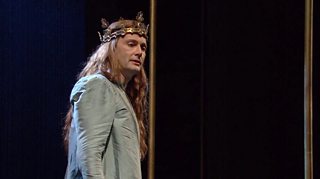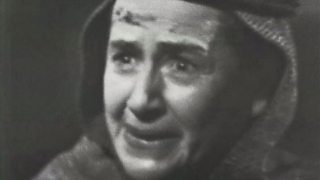The united nations of screen Shakespeare
Rio is hotting up for the start of the 2016 Olympics so as the nations come together for this occasion Shakespeare Lives wanted to look at how other countries have interpreted Shakespeare at the movies.
, lecturer and author of 100 Shakespeare Films for the BFI, went through the archives to pick out a selection of Shakespeare films with an international twist.

By Daniel Rosenthal
While Shakespeare’s homeland has produced some wonderful screen adaptations of his plays – from Olivier’s Oscar-winning Henry V (1944) and Hamlet (1948), to Kenneth Branagh’s Much Ado About Nothing (1992) and Richard Loncraine’s Richard III (1995), starring Ian McKellen – the full spectrum of Shakespeare on film is gloriously global.
Whether it is Russian director Grigori Kozintsev using Boris Pasternak’s translations of Shakespeare as the scripts for his faithful versions of Hamlet (1964) and King Lear (1971), American screenwriters transplanting the plots of Othello and The Taming of the Shrew to late 1990s high schools, or Macbeth reimagined in a fishing village in Madagascar, there is immense geographical and stylistic variety to what you might call “the United Nations of Screen Shakespeare".
Here, then, are a dozen notable adaptations, a tiny sample of the hundreds of international Shakespeare movies made over the past 100 years.
Julius Caesar (USA, 1953)
After MGM’s first big-budget treatment of Shakespeare, George Cukor’s Romeo and Juliet (1936), was a commercial failure, it took the studio 17 years to return to the Bard, with this tense, magnificently acted production.
The apparent gamble of casting of Marlon Brando as Marc Antony – a year after he stunned movie audiences as macho, mumbling Stanley Kowalski in A Streetcar Named Desire – yielded one of his most iconic performances. John Gielgud, a suitably “lean and hungry”-looking Cassius, condemns Caesar with such furious eloquence that you almost cannot blame James Mason’s aloof, well-intentioned Brutus for joining the conspiracy to kill the Emperor.
Joseph L. Mankiewicz’s taut direction respects his producer, John Houseman’s pre-shooting injunction not to “distort Shakespeare’s text with cinematic devices”. When large-scale action is called for, at the Battle of Philippi, Mankiewicz delivers a thrilling, Western-style sequence: archers and cavalry take up positions high above a valley floor and swoop down on Brutus and Cassius’s infantry.
When Julius Caesar opened in Britain, the News Chronicle’s critic found it “maddening” to concede that Hollywood had made “the finest film version of Shakespeare yet”.
Johnny Hamlet (Italy, 1967)
Italian director Enzo G. Castellari blends Hamlet’s revenge plot with spaghetti Western ingredients already familiar to British and American audiences, thanks to the films of Sergio Leone: whip-crack gunshots and deafening punches, extreme eye-line close-ups; sadly, Leone’s energetic pacing, wit and visual flair are absent.
Handsome Johnny Hamilton (Andrea Giordana), a Confederate soldier, returns from the Civil War to find that his rancher father is dead and his mother, Gertie, has married his uncle, Claude, without even “letting father’s bed cool down”. Johnny is reunited with his pre-war girlfriend, Emily (equivalent to Ophelia), daughter of the corrupt local Sheriff, Polomo (Polonius).
Amidst the copious gunfights and poorly dubbed, wooden performances, there is one witty, Tex-Mex-Shakespearean pun (Hamlet lives in Elsinore; Johnny’s home is Ranch El Señor), and one nugget of Hamlet-esque philosophy: the hero’s quick-on-the-draw best friend, Horaz, declares: “No one gets to choose death, but the life… that’s what you choose.”
Ran (Japan, 1985)
One of Japan’s greatest film-makers, Akira Kurosawa made two superb, black-and-white Shakespearean adaptations: Throne of Blood (1957) was a sparely-scripted samurai Macbeth, and The Bad Sleep Well (1960) freely adapted Hamlet into a thriller about public-sector corruption in post-war Tokyo. He waited 25 years and then, aged 70, turned to King Lear, with the spectacular, unrelentingly bleak Ran.
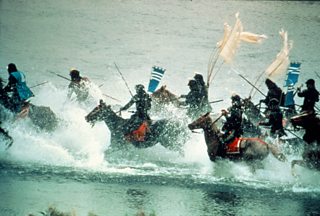
Kurosawa had pondered the legend of Motonari Mori, a 16th-century warlord whose three sons were paragons of goodness, and wondered what might have been if Mori’s children had been less virtuous. He found his answer in Shakespeare. Lear’s daughters become the three sons of aged warlord Hidetora: Taro is equivalent to Goneril, though lacks her implacable malice; Jiro is as ruthless as Regan and Cornwall combined; Saburo is the recalcitrant but devoted Cordelia. Hidetora’s misguided decision to cede power to Taro leads to his downfall, and civil war.
Unlike Lear, Hidetora is not “more sinned against than sinning”. He has spilled “an ocean of blood” while suppressing rival families, and Kurosawa introduces two of his victims: Jiro’s wife, Sué, who watched Hidetora burn her parents alive, and her brother, Tsurumaru (an amalgamation of Edgar and Gloucester), who was blinded by Hidetora. Hidetora also murdered the father and brother of Kaede, Taro’s wife, who turns this Lear into revenge tragedy. She manipulates Jiro into having Taro killed, then seduces and marries Jiro, so that she can complete Hidetora’s destruction.
In the first of two breathtaking battle sequences, Hidetora takes refuge in a wooden castle which is attacked by his elder sons’ troops; as his men are wiped out we see, but cannot hear the terrible carnage: the cacophony is muted and we listen to the trumpets, strings and muffled timpani of Toru Takemitsu’s score. Ran helps explain why Steven Spielberg once called Kurosawa “the pictorial Shakespeare of our time”.
Hamlet Goes Business (Finland, 1987)
In this drab, monochrome comedy, Finland’s king of deadpan humour, Aki Kaurismäki, eccentrically spoofs Hamlet while satirizing capitalism. Old Hamlet, president of a Helsinki timber, mining and shipping empire, is fatally poisoned by his managing director, Klaus, so that Klaus and Gertrud, already lovers, can marry. Old Hamlet’s ghost instructs his son, a horny, gluttonous lay-about, to avenge the murder. His first move is to block Klaus’ plan to sell the family business to a Norwegian tycoon in return for control of Swedish Rubber Ducks – we see board members pass around one of these bath toys as if it were a gold bar.
Hamlet’s language is paraphrased in as banal a fashion as possible: Polonius’s advice to his son, Lauri, turns Shakespeare’s “Neither borrower nor lender be” into “Don’t repay loans too quickly. If the lender dies, you’re out of pocket.” After Hamlet kills Klaus there is a twist ending: Hamlet is murdered by his chauffeur, acting on the orders of a union that wants to prevent dock-workers’ from losing their jobs.
O (USA, 2000)
With a grim, thoughtful screenplay by Brad Kaaya, director Tim Blake-Nelson relocates Othello from Venice and Cyprus to Palmetto Grove, an elite, co-ed boarding school in present-day Charleston, South Carolina. There, scholarship boy and ‘Most Valuable Player’ Odin (Mekhi Phifer) is taking the Palmetto Hawks basketball squad towards the state championship finals, alongside teammates Mike Cass and dependable Hugo (Josh Hartnett), whose father, ‘Duke’, is their passionate, exacting coach. Odin is deeply involved with Desi (Julia Stiles as the story’s Desdemona), the school Dean’s daughter. Hugo goes out with Desi’s room-mate, Emily; Mike’s girlfriend is Brandy (equivalent to Bianca); Hugo’s overweight, friendless roommate, Roger (the Roderigo counterpart), is hopelessly in love with Desi.
Hugo’s machinations closely mirror Iago’s, but, while paraphrasing Shakespeare, Kaaya manages also to confront several “hot-button” issues in American society, most notably, fatal high-school shootings. Blake Nelson was editing the film when, on April 20, 1999, the Columbine Massacre occurred. Overnight, the potent realism of O’s violent finale became too provocative for its US distributors, Miramax, who postponed its release and eventually sold it to Lions Gate Films. O finally opened in the US in August 2001, entering the same box-office Top Ten as its teen antithesis: the gross-out comedy American Pie 2. After 10 Things… and O, Stiles completed a Shakespearean hat-trick by playing Ophelia in Hamlet (2000), opposite Ethan Hawke in the title role.
Makibefo (UK, 2000)
When English-born oceanographer–turned film-maker Alexander Abela arrived in Faux Cap, a fishing village on Continent Island, Madagascar, its inhabitants, members of the Antandroy tribe, had never seen a film, nor heard of Shakespeare. And yet they agreed to make up the cast of this ultra-low-budget, monochrome treatment of Macbeth, in which scenes adapted from the play and performed in the Antandroy’s Malagasy dialect are interspersed with bridging extracts from Shakespeare’s text, delivered in French-accented English (to camera or in voiceover), by a Storyteller (Gilbert Lamourd, from Guadaloupe).
Peaceful village life is upset after a witchdoctor predicts glory for Makibefo (the tall, intimidating Martin). Makibefo soon kills his venerable, grey-haired king, Danikany, and his best friend, Bakoua, whose ashen-faced ghost soon appears. Makibefo’s wife, overcome with remorse for her complicity in the regicide, kills herself. Her husband’s reign is violently curtailed by Danikany’s sons, Malikomy and Makidofy.
The film works both as stripped-down Shakespearean tragedy (Makibefo and his wife speak no more than 300 words between them), and a documentary-like portrait of a remote community.
The Banquet (China/Hong Kong, 2006)
Feng Xiaogang’s The Banquet – graceful, violent, gorgeously photographed and designed – clothes the skeleton of Hamlet with the intrigues, doomed romance and gravity-defying, wuxia martial arts action of Zhang Yimou’s Hero (2002) and House of Flying Daggers (2004).
In a nameless Chinese kingdom in 904AD, Crown Prince Wu Luan (solemnly played by Daniel Wu) loves Wan (Zhang Ziyi), but travels south after his father, the Emperor, claims her as his Empress, and immerses himself in music and dance (equivalent to Hamlet’s studies at Wittenberg). Three years later, his uncle, Li, murders the Emperor and usurps the throne. Li’s black-masked warriors massacre Wu Luan’s fellow singer–dancers, but the prince escapes and returns to the palace. There he seeks revenge, but – in this ensemble-oriented adaptation – his progress is frustrated less by Hamlet-like indecision than the sexual and political desires of other leading characters.
The palace is full of candle-lit halls lined with servants and guards, and composer Tan Dun provides aptly grand themes reminiscent of his Oscar-winning score for another wuxia epic, Crouching Tiger, Hidden Dragon.
Joe Macbeth (UK, 1955)
Although it’s a British production, I’ve included this low-budget, black-and-white gem, set in 1950s America, because it shows how neatly Macbeth could fit the genre mould of the classic Hollywood gangster movie. Directed by Ken Hughes, it uncovers common ground between the play’s 11th-century thanes and 20th-century organized criminals: both groups swear absolute loyalty to King/Godfather, summarily execute traitors and ‘whack’ anyone who blocks their ascent to power.
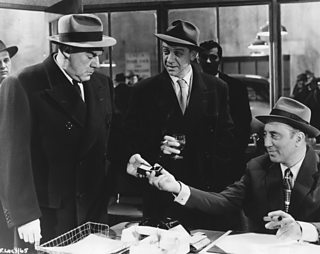
The hero of Philip Yordan’s entertaining, blackly comic screenplay is burly-but-dim Joe (Paul Douglas), an obedient enforcer for cigar-chomping gangland boss Mr. del Duca (Grégoire Aslan). After a night-club fortune-teller predicts that Joe will supplant del Duca as “King of the City”, and his domineering new bride, Lily (Ruth Roman), spurs him on, the body count swiftly rises, closely following its Shakespearean template. Joe’s victims include his best pal, Bankie (Sid James of Carry On… fame). In a cruel twist on the play, he accidentally shoots Lily dead, before he is gunned down by Bankie’s vengeful son, Lennie.
Several other film-makers have presented the Scottish play as a mob thriller, including William Reilly (with the risible, New York-set Men of Respect in 1991), Vishal Bhardwaj (with Maqbool, see below) and Australia’s Geoffrey Wright, whose original-text Macbeth (2006), using Shakespeare’s text, was set in present-day Melbourne gangland; they are all indebted to Joe Macbeth.
Forbidden Planet (USA, 1956)
The Tempest takes us to a remote island ruled by an exiled Duke-turned-magician, who lives with his beautiful, naïve daughter, Miranda. The delightful Forbidden Planet sends a 23rd-century Universal Planets spaceship – skippered by unflappable Commander Adams (Leslie Nielsen) – to a remote planet, Altair-4, ruled by the bearded, refined Dr. Morbius (Walter Pidgeon), who has harnessed ‘magical’ scientific power and lives happily with his beautiful, naïve daughter, Altaira (mini-skirted Anne Francis). She, like Miranda, has “never known any human being except her father”, and falls for Adams, just as Miranda falls for Ferdinand. All the human characters compete with a scene-stealing performance by Robby the Robot, the Ariel counterpart who serves Morbius. Prospero’s quest for revenge against the men who drove him into exile is here replaced by a hokey plot involving “monsters from the Id”.
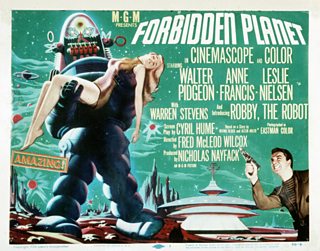
When the film reached Britain, the Evening Standard’s critic Alan Brien’s review was headlined “Shakespeare takes a journey into space” and he praised Cyril Hume for writing “the most rumbustiously enjoyable of all Hollywood planetary melodramas, apparently by dressing The Tempest in space suits.”
King Lear (USSR, 1971)
Blessed with a magnificent score by Dmitri Shostakovich, Grigori Kozintsev’s moving Soviet epic begins with hundreds of shuffling, hooded peasants congregating outside Lear’s castle. After Lear (slight, white-haired Yuri Yarvet) has divided the kingdom between two of his daughters, he appears above the main gate and the masses bow down as to a messiah. Throughout, we see Shakespeare’s play refracted through Russia’s obsession with a hungry, oppressed proletariat, so much so that the Sunday Telegraph welcomed “a remarkably successful translation of the play into Communist terms”.
In a uniformly excellent ensemble, Yarvet is cinema’s most affectingly restrained Lear, and Oleg Dal’s haunting Fool has the shaven head and half-starved body of, in Kozintsev’s words, “a boy from Auschwitz”.
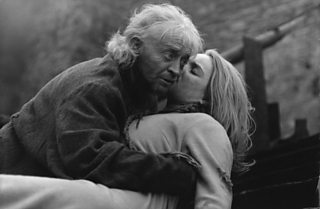
The film’s protracted location shooting is chronicled in the director’s fascinating 1973 book, King Lear: The Space of Tragedy.
10 Things I Hate About You (USA, 1999)
Blessed with energetic performances and an exceptionally witty, intelligent script, this Hollywood take on The Taming of the Shrew was one of the most enjoyable teen comedies of the 1990s.
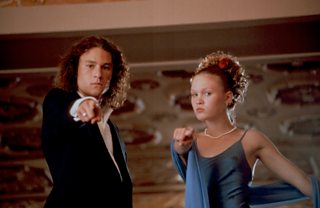
At Padua High School (peopled by eccentric teachers and bizarre student cliques) in Seattle, new boy Cameron (Joseph Gordon-Levitt) falls for the beautiful but vapid Bianca Stratford (Larisa Oleynik). A wealthy, vain pupil, Joey (Andrew Keegan, as the Shrew’s Hortensio and Gremio rolled into one), also sets his sights on Bianca. The plot moves into gear when her father loosens his strict house rule for Bianca and her older, boy-hating sister Katerina (Julia Stiles): “no dating ’til you graduate” becomes Bianca can date – if Kat does.
So Cameron convinces Joey to hire a boyfriend for Kat, and Pat Verona (Heath Ledger), the school’s Australian-accented rebel, accepts the job, for $100 per date.
Pat realizes that his habitual, macho tactics (which serve his Shakespearean counterpart, Petruchio) will not work on Kat, so the Shrew takes on a ‘caring, sharing’ 1990s slant: to tame the shrew, the hero must tame himself.
Sadly, when 10 Things… screenwriters Karen McCullah Lutz and Kirsten Smith co-wrote the Twelfth-Night-goes-to-high-school comedy She’s the Man (2006), starring Amanda Bynes as a cross-dressing Viola, the result was a laboured, unfunny mess.
Maqbool (India, 2004)
Vishal Bhardwaj’s vision of Macbeth unfolds in present-day Mumbai, where we meet gravel-voiced crime lord, Abbaji, a short, paunchy widower with a much younger, actress mistress, Nimmi (Tabbu). Miyan Maqbool (the taciturn Irfan Khan), is Abbaji’s right-hand man, treated almost like a son. What makes Bhardwaj’s take on Macbeth radical is Maqbool’s bachelor status: this hero is destroyed by his desire for the king’s woman, not his crown.
Throughout the build-up to Maqbool’s murder of Abbaji, and the consequent cycle of violence (more complicated than Shakespeare’s), Bhardwaj explores real-life Mumbai’s unholy alliances between underworld, Bollywood, politics and police. The play’s three witches become two corrupt cops: Inspectors Purohit and Pandit (a joyful double-act between Naseeruddin Shah and Om Puri); the latter expertly divines Maqbool’s shifting fortunes in kundali (astrology) charts – one traced in a dish of leftover curry, another in blood.
Bhardwaj’s storytelling has poise and intelligence – qualities he displayed again in two Shakespearean follow-ups also set in contemporary India: Omkara (2006) transplanted Othello to Uttar Pradesh, and Haider (2014) reworked Hamlet in Kashmir.

More on Shakespeare...
-
![]()
Experience an incredible commemoration of the Bard's 400th death anniversary with videos feauring David Tennant, Ian McKellan, Adrian Lester and more
-
![]()
A great collection of actors, authors, writers, including Russell T Davies, Germaine Greer and Salman Rushdie, celebrating the Bard at the arts and literature gathering
-
![]()
Watch some of the most memorable Shakespeare speeches, as chosen by the RSC, featuring Peggy Ashcroft, Patrick Stewart, Vanessa Redgrave and more
-
![]()
From the Bard's influence on pop music to his face appearing on a 拢20 banknote, discover more unorthodox and unusual tales of Shakespeare from past to present
